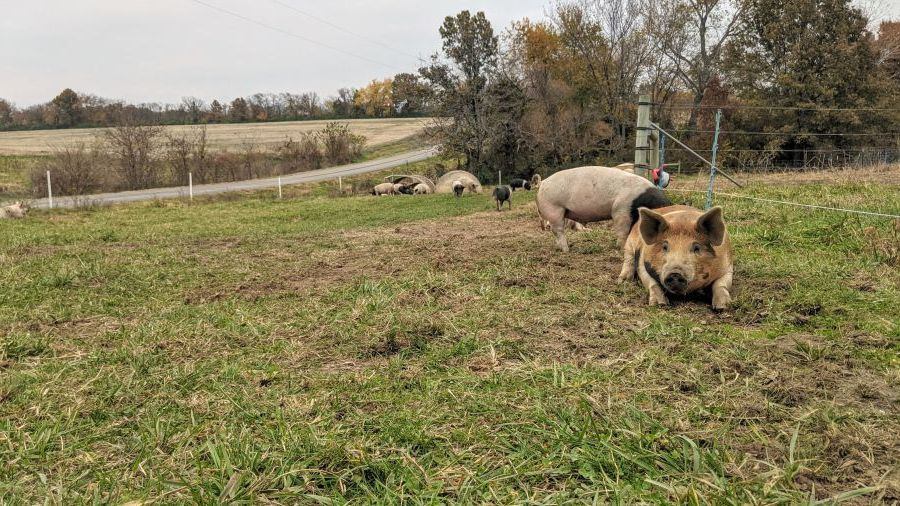Why Yolk Color Is No Longer a Trademark of Healthy Eggs
posted on
January 23, 2024

"You can tell the difference between eggs from pasture-raised and confined hens by the yolk color." You've probably had someone tell you that before. And years ago, you could. But with a new understanding of pigments and corporations trying to keep up with the demand for better eggs, that is no longer the case.
What Gives Egg Yolks Their Color?
Egg yolks can range from white to red, and even green. The color of an egg yolk is largely determined by the pigments a hen consumes in her diet, the most common being carotenoids. Carotenoids give an egg yolk its white, yellow, gold, or red coloring. Most hens get these through corn, soy, alfalfa, or natural forage in their diet. Other foods high in carotenoids include carrots, kale, and bell peppers.
Can You Tell What a Hen Ate by the Yolk Color?
A hen whose diet consists of mainly wheat will typically lay more pale-yellow yolks since wheat contains fewer carotenoids, while a diet high in corn and soy results in yolks with a brighter yellow. A diet high in natural forage will produce the rich orange-to-red yolk that most people have learned to associate with pasture-raised or free-range hens.
Can Dark Yolks Only Come From Pasture-Raised Hens?
Because of the common understanding that eggs from hens raised outdoors on a high-forage diet are healthier, many of us now search for those dark-colored yolks. However, conventional farmers know this and have figured out ways to make their egg yolks darker, making them more appealing and fooling consumers.
Can Brown Eggs only come from Pasture-Raised Hens?
Side note: This is yet another misconception about eggs that the industry has taken advantage of. The color of an eggshell - whether it's white, brown, or colored - is genetic and not representative whatsoever of the source or nutrient value of the egg. The shade of a brown or green eggshell can vary from hen to hen based on genetics or diet, but both white and brown egg layers can be raised in confinement, and likewise, either can be raised on pasture.
How Do Poultry Producers Control the Color of Their Egg Yolks?
Ingredients like marigold, capsicum, paprika, and synthetic additives can be added to a hen's diet to influence the resulting color of the egg yolk. Today, even a chicken raised its entire life indoors can produce a deep orange yolk thanks to these practices. These additives are also given to commercial shrimp, fish, and meat chickens to make the color of their skin more appealing in some regions.
How Can I Know if My Eggs Came From Pasture-Raised Hens?
One of the ways you can determine whether or not a hen is being raised on pasture is by the consistency of the egg yolk color. Hens raised indoors and fed a strict diet will have little to no variation in the color of their yolks, while hens raised on pasture will have more color variation since their diet varies from hen to hen, paddock to paddock, and season to season.
The only way to know for certain what a hen ate is to get an honest answer from the farmer. This is just another example of why we encourage buying your meat and eggs directly from the person who produced them, or at least from someone who knows the producer.
Does David's Pasture Use Coloring Agents in Their Hens' Feed?
We do not use any coloring agents in our hens' feed, and because of this, the color of our egg yolks changes seasonally. Here in the Midwest, we do not have green pastures year-round, so in the winter, our hens rely more heavily on a diet of non-GMO grains and their yolks turn a shade of yellow. But once spring comes and the green forage is back, our yolks are a beautiful golden-orange again.
If you live in the Kansas City area or are within driving distance of our farm, you can order our pasture-raised eggs here. If they do not show on our website, feel free to contact me through our contact page.
Thank you for reading! I hope this article has made you a more informed eater and equipped you with the tools needed to find the best eggs for your family. If you have any more egg questions feel free to leave a comment below!
If you are looking for some egg-cellent recipe inspo, check out Kim's Favorite Breakfast Quiche and my personal favorite, this Egg Yolk Latte.
In good eating,
Remi Kesten



